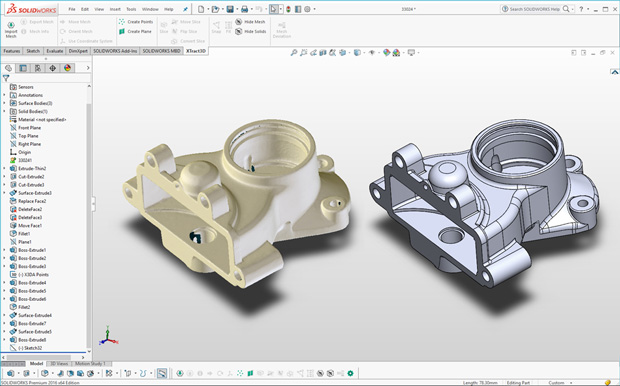Editor’s Pick: XTract3D for SOLIDWORKS

XTract3D, a cross-sectioning toolset for sketching CAD models based on 3D scan data, works from within the SOLIDWORKS design environment. Image courtesy of Polyga Inc.
Latest News
February 1, 2017
Right before a major CAD developer has its big user wingding, the newswires start buzzing with interesting, albeit lesser-known products that extend the solution in ways that engineers can really use. SOLIDWORKS World 2017 is just days away, and today's Pick of the Week fits the description of such a tool.
Vancouver-based Polyga Inc. recently launched XTract3D, a 3D mesh processing add-in toolset for SOLIDWORKS. You work with XTract3D from inside of SOLIDWORKS, and its toolbar offers you slicing, fitting and analysis tools to make 3D scan data SOLIDWORKS-editable solids and surfaces.
This means that your reverse engineering mesh processing workflow becomes: Import the scan mesh data, invoke XTract3D and then manually sketch features and elements. Polyga says that the software will handle a range of reverse engineering and design applications like simple 2D sketches, complex 3D surfaces and 3D meshes containing millions of polygons.
With XTract3D you can reverse engineer an entire scanned part or use scan data as a reference for all-new parts. From watching the videos on the Polyga website, it seems that XTract3D tools conform with the SOLIDWORKS interface paradigm, so learning it should be a breeze. If you can use SOLIDWORKS, you should be just fine. It also appears to be fast and responsive to your commands.
That said, one XTract3D characteristic is a pleasant surprise: Simplicity. It isn't loaded with features that make doing the job complicated. It's not like your word processor's toolbar with a clutter of universally understood icons that you have no idea about what they do. It simply has the small set of tools that you need to sketch out a solid from 2D cross-sections of scanned data to create a stable model that's ready for SOLIDWORKS.
 XTract3D, a cross-sectioning toolset for sketching CAD models based on 3D scan data, works from within the SOLIDWORKS design environment. Image courtesy of Polyga Inc.
XTract3D, a cross-sectioning toolset for sketching CAD models based on 3D scan data, works from within the SOLIDWORKS design environment. Image courtesy of Polyga Inc.Also interesting is pricing. Yes, there's a reasonably priced single-user, lifetime license of XTract3D available. But you can rent it for 30 days for 500 bucks. That seems perfectly aligned for those short-term and once-a-year projects that you tend to farm out to somebody for a lot more.
The short of it: XTract3D sounds really useful. You can learn more about XTract3D from today’s Pick of the Week write-up. Make sure to take in the videos to see it in action. You can also get yourself an evaluation copy to try for a few days.
Thanks, Pal. – Lockwood
Anthony J. Lockwood
Editor at Large, DE
Subscribe to our FREE magazine, FREE email newsletters or both!
Latest News
About the Author
Anthony J. Lockwood is Digital Engineering’s founding editor. He is now retired. Contact him via [email protected].
Follow DE






